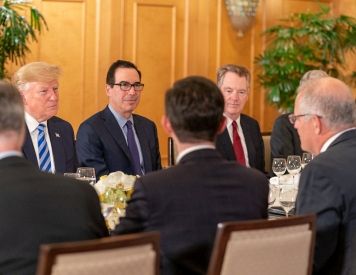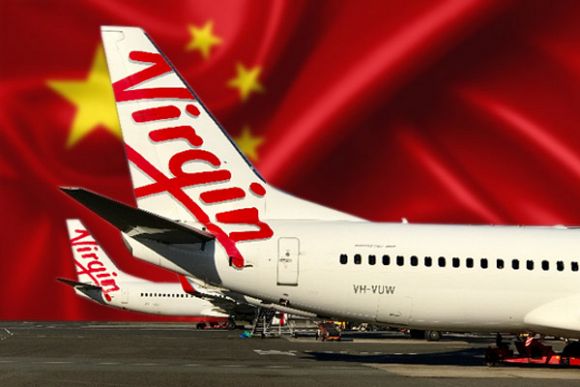While China is imperfect, many of the criticisms levied against it are misleading and unfair, writes Dr William Briggs.
It would be nice to think that the Great Wall of China could be seen from space. But alas it isn't. Even so, people like to believe it is, want it to be and despite evidence to the contrary, it remains "true".
We have been told, so very many times, that China poses a real and present danger to all that we hold dear and, regardless of the truth, it, like the Great Wall’s visibility from space has become a "truth".
Is China a threat? Presidents, prime ministers, governments and opposition parties all tell us that this is so. There is barely a day passes without the media finding new and more expansive ways to "prove" the existence of this threat.
Bookshelves groan under the accumulated weight of works from academics, present and past foreign correspondents, and government advisors all happy to share their views in declaring the threat to be real.
And while all this goes on, the voices of dissent become marginalised.
The reading list promoting a threat perception is vast. Well-credentialed authors have produced such titles as The China Threat, The Coming Conflict with China, Silent Invasion, China: The Gathering Threat and When China Rules the World, a best-seller boasting more than 250,000 sales.
The list is a depressingly long one. Is everybody right? Is China a threat and if so, whom does it threaten?
At one important level, China does pose a threat, but not in the way that our political leaders, leader writers or the bulk of scholars perceive it. The threat is not ideological, is not cultural, is not based on race, ethnicity or geography.
China’s development has led it to become a capitalist entity and a competitor for economic hegemony with the U.S. The threat is to the supremacy of the U.S. On this count, China stands accused and is guilty as charged. Its crime has been to follow the example of other successful capitalist economies. The crime has been made all the more heinous because it has been successful.
What is alarming is that a simple fact of economic and capitalist life has become the basis for such fearmongering and sabre-rattling. The fact is that empires rise and fall, and economies rise at the expense of competing economies.
The sun is rising on China.
Does this warrant the denunciations, the finger-pointing and fist-shaking that is crowding our news and the bookshelves of the world?
The threat scenario surrounding China runs from military to trade to "soft power" to investments and to ideology. Are we right to be fearful? If we look at each item on the charge sheet, then the answer is no.
Where is the Chinese military and its fleet? In China or on its borders. Can the same be said of our premier ally, the U.S?
Yes, China engages in a deliberate use of "soft power" or what might be better described as economic diplomacy. Interestingly we no longer speak of U.S. cultural imperialism, but it is a phrase worth remembering.
The reach of U.S. culture has stretched to the farthest corners of the planet.
China is a big overseas investor, but even when Hong Kong’s investments in Australia are added to the mix, Chinese investments make up just 5.7% of total foreign investment in Australia, according to DFAT figures. The strictly Chinese component is just 2%. The U.S., on the other hand, accounts for 25.6% of the total. Should we be fearful of US investment? Should we be fearful of Luxembourg, whose investments make up 2.2%? Absolutely not.
An economy survives because other economies invest and yet so much fear is engendered about Chinese investments. But if some of the charges against China look a bit wobbly, then surely the fact that it is an authoritarian country ruled by a Communist party is enough to damn them.
When China was on the way up, when the U.S. had a policy of constructive engagement and saw China as a source of cheap labour for American multinational corporations, the party was in control. Nobody was concerned. Now that its economy is rivalling that of the U.S., then the word Communist is so eagerly bandied about.
China does not always behave as we might wish it to behave. The list of things to criticise is nearly as long as the list of books that expose the growing Chinese threat. Its internal affairs and the treatment of its working people, intellectuals and its handling of dissent are shameful. Yes, it spies on its neighbours and seeks to place its "interests" ahead of other considerations.
The U.S. also has a long and blemished record on all these counts. Australia is hardly a paragon of virtue.
This country has been chastised by international institutions for its treatment of indigenous people and refugees, has engaged in every U.S.-led war since the end of World War II, is engaged in a massive military build-up and has spied on its neighbours.
China is no different, no better but certainly no worse than its major rival.
This is of no interest to the growing army of observers and watchers who find a Chinese threat behind every bush and tree. As its star rises and the sun sets on the American century, then so too will China become an even bigger target and the myth of threat will become a reality because it will have been said enough times to make it so.
The Great Wall might not be visible from space, but the growing anti-China rhetoric might well be.
Dr William Briggs is a political economist whose special areas of interest lies in political theory. He has been, variously, a teacher, journalist and political activist.
Related Articles
- The importance of making up with China
- JOHN PILGER: Another Hiroshima is coming unless we stop it now
- Morrison's more aggressive military stance only antagonises
- Because of COVID-19, China and Japan have found common ground
- Between China and America, we chose the wrong friend
 This work is licensed under a Creative Commons Attribution-NonCommercial-NoDerivs 3.0 Australia License
This work is licensed under a Creative Commons Attribution-NonCommercial-NoDerivs 3.0 Australia License
Support independent journalism Subscribe to IA.
















